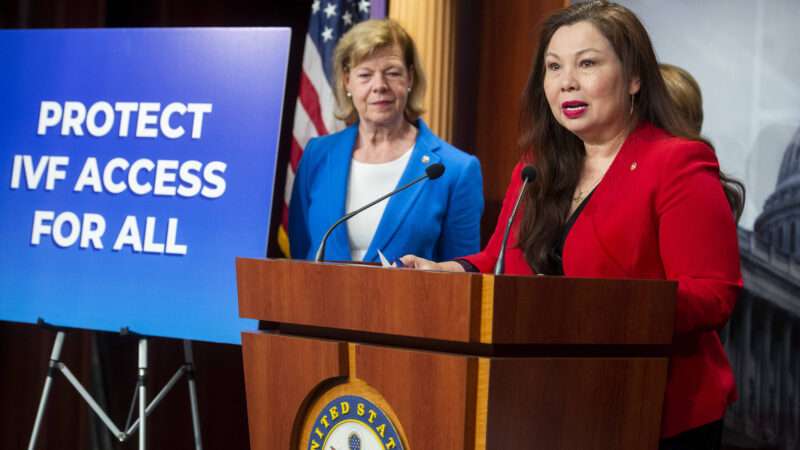
A trio of Democratic senators are introducing a "Right to IVF Act" that would, among other things, force private health insurance plans to cover assisted reproduction treatments such as in vitro fertilization (IVF), egg freezing, and gestational surrogacy.
The measure provides no exception or accommodations for religious objections, all but ensuring massive legal battles over the mandate should it pass.
The "sweeping legislative package" (as the senators describe it) combines several existing pieces of legislation, including the Access to Family Building Act and the Family Building Federal Employees Health Benefit Fairness Act sponsored by Sen. Tammy Duckworth (D–Ill.), the Veteran Families Health Services Act from Sen. Patty Murray (D–Wash.), and the Access to Infertility Treatment and Care Act from Sen. Cory Booker (D–N.J.).
Booker's contribution here is probably the most controversial. It requires coverage for assisted reproduction from any health care plan that covers obstetric services.
A Reverse Contraception Mandate
Remember the Affordable Care Act's contraception mandate, which required private health insurance plans to cover birth control (allegedly) at no cost to plan participants? It spawned some big legal battles over the rights of religious employers and institutions not to offer staff health plans that included birth control coverage.
Booker's Access to Infertility Treatment and Care Act is a lot like the Obamacare contraception mandate, except instead of requiring health care plans to cover the costs of avoiding pregnancy it would require them to cover treatments to help people become pregnant.
The bill states that all group health plans or health insurance issuers offering group or individual health insurance must cover assisted reproduction and fertility preservation treatments if they cover any obstetric services. It defines assisted reproductive technology as "treatments or procedures that involve the handling of human egg, sperm, and embryo outside of the body with the intent of facilitating a pregnancy, including in vitro fertilization, egg, embryo, or sperm cryopreservation, egg or embryo donation, and gestational surrogacy."
Health insurance plans could only require participant cost-sharing (in the form of co-pays, deductibles, etc.) for such services to the same extent that they require cost-sharing for similar services.
What Could Go Wrong?
It seems like it should go without saying by now but there is no such thing as government-mandated healthcare savings. Authorities can order health care plans to cover IVF (or contraception or whatever) and cap point-of-service costs for plan participants, but health insurers will inevitably pass these costs on to consumers in other ways—leading to higher insurance premiums overall or other health care cost increases.
Yes, IVF and other fertility procedures are expensive. But a mandate like this could actually risk raising IVF costs.
When a lot of people are paying out of pocket for fertility treatments, medical professionals have an incentive to keep costs affordable in order to attract patients. If everyone's insurance covers IVF and patients needn't bother with comparing costs or weighing costs versus benefits, there's nothing to stop medical providers from raising prices greatly. We'll see the same cost inflation we've seen in other sectors of the U.S. healthcare marketplace—a situation that not only balloons health care spending generally (and gets passed on to consumers one way or another) but makes fertility treatments out of reach for people who don't have insurance that covers such treatments.
Raising costs isn't the only issue here, of course. There's the matter of more government intervention in private markets (something some of us are still wild-eyed enough to oppose!).
Offering employee health care plans that cover IVF could be a good selling point for recruiting potential employees or keeping existing employees happy. But there's no reason that every employer should have to do so, just because lawmakers want IVF to be more accessible.
It's unfair to employers—big or small, religious or non-religious—to say they all must take on the costs of offering health care plans that cover pricey fertility treatments. And Booker's bill contains no exceptions for small businesses or for entities with religious or ethical objections.
A lot of religious people are morally opposed to things like IVF and surrogacy. This measure would force religious employers to subsidize and tacitly condone these things if they wanted to offer employees health care plans with any obstetrics coverage at all.
As with any government intervention in free markets, there's the possibility that this fertility treatment mandate would distort incentives. IVF can certainly be an invaluable tool for folks experiencing infertility. But it's also very expensive and very taxing—emotionally and physically—for the women undergoing it, with far from universal success rates. The new mandate could encourage people who may not be good candidates for IVF to keep trying it, perhaps nudging them away from other options (like adoption) that might be better suited to their circumstances.
'Access' Vs. Whatever This Is
Since Roe v. Wade was overturned, many Americans have worried that the legal regime change would pave the way for outlawing things like contraception or IVF, too. Encoding into law (or legal precedent) the idea that fertilized eggs are people could have negative implications for these things, even if many conservative politicians pledge (and demonstrate) that IVF and birth control are safe. In response, some progressive politicians—perhaps genuinely concerned, perhaps sensing political opportunity (or why not both?)—have started talking a lot about the need to protect access to IVF across the country.
As much as I agree with this goal, I think IVF's legality is better off as a state-by-state matter. That said, the "protect IVF nationwide" impulse wouldn't be so bad if "protecting access" simply meant making sure that the procedure was legal.
But as we've seen again and again over the past couple decades, Democrats tend to define health care and medicine "access" differently.
The new Right to IVF Act would establish a national right to provide or receive assisted reproduction services. In their press release, the senators say this last bit would "pre-empt any state effort to limit such access and ensur[e] no hopeful parent—or their doctors—are punished for trying to start or grow a family." OK.
But that's not all it would do. The bill's text states that "an individual has a statutory right under this Act, including without prohibition or unreasonable limitation or interference (such as due to financial cost or detriment to the individual's health, including mental health), to—(A) access assisted reproductive technology; (B) continue or complete an ongoing assisted reproductive technology treatment or procedure pursuant to a written plan or agreement with a health care provider; and (C) retain all rights regarding the use or disposition of reproductive genetic materials, including gametes."
Note that bit about financial cost. It's kind of confusingly worded and it's unclear exactly what that would mean in practice. But it could give the government leeway to directly intervene if they think IVF is broadly unaffordable or to place more demands on individual health care facilities, providers, insurance plans, etc., to help cover the costs of IVF for people whom it would otherwise be financially out of reach.
This is the distilled essence of how Democrats go too far on issues like this. They're not content to say "People shouldn't be punished for utilizing/offering IVF" or that the practice shouldn't be illegal. They look at authoritarian or overreaching possibilities from the other side (like banning or criminalizing IVF) and respond with overreaching proposals of their own.
More Sex & Tech News
• A proposal in New York would ban the use of algorithmic feeds on minors' social media accounts unless kids get permission from their parents. The Wall Street Journal reports that "critics say the feeds lead children to violent and sexually explicit content"—an insane contention since the sorts of automated filters that employ algorithms are precisely what keep people's feeds from being overrun by things they or the platforms don't want them to see.
• Michael Moynihan on how Vice "went from a $6 billion media empire to bankruptcy."
• Authors are urging South Carolina to stop new educational regulations that would deem any descriptions of "sexual conduct" inappropriate through grade 12. "This is alarming as we have witnessed how similar language applied in states like Iowa has resulted in mass book bans affecting classics, 20th-century masterpieces, books used in AP courses, and contemporary Young Adult novels," they write.
• Tennessee Gov. Bill Lee just signed into law a requirement for porn websites to check IDs or otherwise verify visitor ages.
• Australia's National Mental Health Commission just put out a big report on teens, screens, and mental health, cautioning that there's a lack of evidence for the idea that social media and smartphone use are causing mental problems in teens. "A range of societal and cultural shifts are likely each independently and in combination contributing to increased mental ill-health and distress," the commission states on its website. "The effects of digital technologies on mental health are not yet well understood, and evidence in this area is emerging."
Today's Image

The post 'Right to IVF Act' Would Mandate Insurance Coverage for IVF, Surrogacy, Egg Freezing, and More appeared first on Reason.com.







